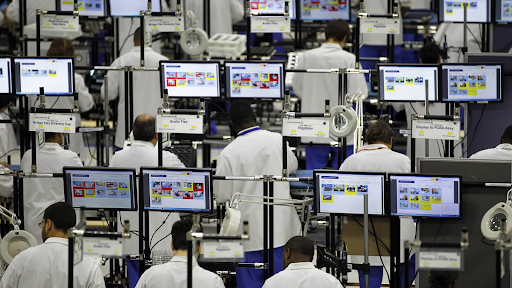Productivity, the measure of how much output in goods and services an employee can produce in an hour, fell in the first half of 2022 more steeply than at any time since 1947, according to data from the Bureau of Labor Statistics, but some of the best known tech CEOs dismiss worries about slacking employees as “productivity paranoia.”
What’s the baseline: Whether the perceived drop in productivity is real or simply a correction is a matter of debate. Productivity increased dramatically over the past two years as workers abruptly shifted from commuting to offices to working from home. You might recall that employees working from home tended to fill the time they would have spent commuting checking their emails and working on reports, mindful to look busy while the economy shut down around them. Productivity increased more than 10 percent in April 2020, but has fallen slightly more than 4 percent so far this year.
Further scrambling the picture is that productivity is booming in the manufacturing sector, where for obvious reasons it is easy to measure, but has decreased through the rest of the private sector. Diego Comin, professor of economics at Dartmouth College, told the Washington Post that it is tough to measure productivity of knowledge workers.
“It is strange,” Comin said. “The data is very odd these past couple of quarters in so many different ways. It’s hard to even tell a coherent story.”
The worriers
Some top CEOs are clearly freaking out. Count among them Sundar Pinchai, CEO of Google, who launched a companywide “Simplicity Sprint” last summer to gather ideas for improving productivity.
At about the same point last summer, Mark Zuckerberg, CEO of Meta, was flummoxed during one of his Q&A sessions when the first question was not about a leaner Meta but whether the extra days off granted to employees during the pandemic would continue next year.
Is it real, or is it productivity paranoia?
Microsoft CEO Satya Nadella doesn’t share the concerns of his executive peers. At Microsoft they refer to “productivity paranoia” to describe (mock?) the worry other employers have about whether their teams are working hard. Nadella suggested to Bloomberg News in September that this productivity paranoia is driving some employers to monitor employees electronically, which might just be making matters worse.
“Ultimately, for the business, these (monitoring) tools are about really helping their employees thrive,” Nadella said. “The only way a business is successful and productive is if employees feel that sense of empowerment, that sense of energy and connection for the company’s mission and are doing meaningful work.”
One theory about the perceived decline in productivity is that it’s a simple matter of what goes up, must come down. Economist Lawrence H. Summers, president emeritus of Harvard University and former treasury secretary, theorized it might have to do with employees who “were working unsustainably hard” in 2020 and 2021.
“There’s a highly empowered workforce that was engaged in a certain amount of quiet quitting,” Summers said. That’s creating “a certain amount of absenteeism on and off the job” that is probably leading to lower productivity, he said.
The decline in productivity this year follows a 4.3 percent increase in the first quarter of last year, which was one of the highest rates in years, according to the Labor Department. Productivity growth slowed to 2.3 percent the following quarter, which was still nearly double the feeble productivity rate increases in the decade after the 2007-2008 financial crisis.
People are just burned out
Mentions of burnout are up 42 percent in employee reviews on Glassdoor, compared with 2019 data, said chief economist Aaron Terrazas. Mentions of overwork are up 12 percent.
“You have to expect that takes a toll on people’s productivity,” Terrazas said.
It might be that people are realizing their job isn’t all there is to life and they don’t have to keep faking “passion” for what they do to pay their rent. Maybe the boss’ “productivity paranoia” simply isn’t anything for workers to worry about.
Peter Page is the Contributions Editor at Grit Daily. Formerly at Entrepreneur.com, he began his journalism career as a newspaper reporter long before print journalism had even heard of the internet, much less realized it would demolish the industry. The years he worked a police reporter are a big influence on his world view to this day. Page has some degree of expertise in environmental policy, the energy economy, ecosystem dynamics, the anthropology of urban gangs, the workings of civil and criminal courts, politics, the machinations of government, and the art of crystallizing thought in writing.
Credit: Source link


Comments are closed.